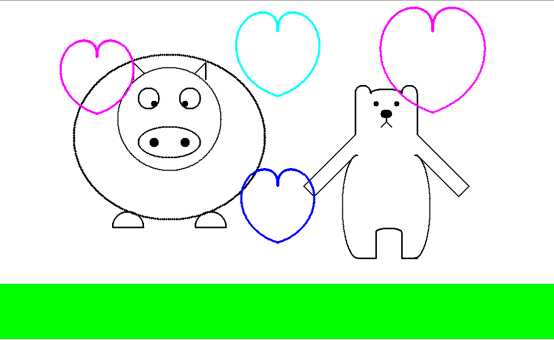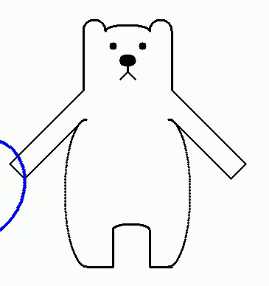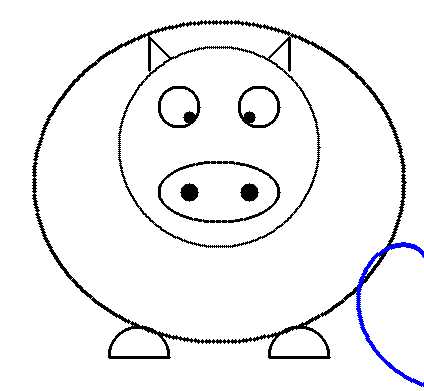本教程介绍了如何使用opencv生成一副简笔画视频,包括片头、如何做画等。
1、视频包括:
(1)片头:包括学号姓名,同时会出现"I Love CV"在学号和姓名的中央,而且他们是以动画方式“飞入”视频的,其中姓名从顶部“飞”到屏幕1/3处,学号信息从下“飞”到1/3处,I LOVE CV从左向右飞入。在片头显示完后,会停顿越三秒钟后,片头消失,正片开始。
下图为片头停顿处截图:
(2)正片:正片主要画了一头可爱的小熊和一头胖胖的小猪以及一个桃心(预示着小熊.....),其中所有的镜头最小单位都是像素,是一个点一个点画计算并画出的,并没有调用内置的画图函数(画点函数除外)以下是最终效果截图:

一、开发环境
1、开发环境:vs2015
2、Opencv库:opencv2.4
3、操作系统:windows10
二、实现方法
我把整个实现分为三步:
初始化、工具函数的编写、画图
下面将分开说明各部分实现步骤:
1、初始化:首先定义两个全局变量ViedoWriter writer和Mat image,并对其初始化,分别在规定路径创建一个空视频(writer)和空矩阵或图片(image)。我的想法是一个点一个点的画图,所以我需要每画一个点或者一个规定步长的点就网writer里写一帧,所以我封装了一个函数putPicture(Mat img)用于将参数传入writer中。在以后的画图工具函数中,我每描出一个点就调用一次putPicture函数。
2、对于工具函数的撰写,我主要写了以下几个函数:
(1)drawPoint(Mat img, Point center,Scalar color,int thick)
功能:可以再指定的center上画不同大小的点(大小由thick参数指定)。该函数是画所有图的核心函数
实现:调用opencv的circle函数
(2)drawLine(Mat mat, Point start, Point end,Scalar color,int thick)
功能:通过起始终止点画出一条线段并将每个点以一帧的形式存入视频。
实现:使用DDA算法画直线。
改进:DDA有舍入误差会影响精度,可以使用bersenham算法,但我没有时间了。。。
(3)drawArc(Mat img, Point center, double radius, double start_angle, double end_angle, Scalar color,int thick)
功能:通过给定参数逐点画圆弧并将每个点以一帧的形式存入视频。
实现:用圆的参数方程逐点描出
改进:可使用bersenham算法,但我个人觉得针对此问题没必要,增加很多算法上的负担。因为此问题不太要求精度。
(4)drawEarc(Mat img, Point center, double radius, double start_angle, double end_angle, float a,float b,Scalar color,int thick,bool is_x)
功能:通过给定参数画椭圆弧并将每个点以一帧的形式存入视频,其中通过is_x变量可以指定焦点位置,同时thick可以指定宽度,color指定颜色
实现:同样使用参数方程
(5)drawStar(Mat img,Point center,int a,Scalar color,int thick)
功能:通过给定参数画心形并将每个点以一帧的形式存入视频,其中a可指定心形的大小。
实现:
arc.x = center.x + a*i*sin(PI*sin(i) / i);
arc.y = center.y + a*abs(i)*cos(PI*sin(i) / i);
并没有使用经典的笛卡尔心形公式,而是使用的这个形状更好看的参数方程。
(6)drawBackground(bool flag)
功能:画一个白色的大矩形覆盖整个屏幕,起到画背景和清屏的作用
3、有了以上制作视频思路和工具最后的画图部分考验的更多的是时间,我主要分了三部分来画
(1)drawBear()
功能:顾名思义画熊。对于这个萌萌哒的小熊:

他的身子是椭圆的一部分弧,耳朵是圆的一部分,鼻子是一个小椭圆但是我增加了线的厚度。
改进:需要改进的部分太多了,由于我是“凭空”使用我的工具画的,并没有使用ps等工具具体的挖出精确的点来画,所以导致很多部分无法完成。这也导致只熊的身子和腿很丑。
(2)drawRh()
功能:画猪

这个猪的构造很简单,我没有选择有复杂曲线的猪,选择了这个可以由圆构成的猪。
改进:可以使用参数曲线算法来丰富他的身体。
(3)drawText()
功能:制作片头
实现方法:使用内置的puttext函数,加上清屏函数组合来完成文字的滑动,即每移动一次字幕调用清屏函数,最后使用临时变量保存的算法使三行字幕停顿几秒钟。
三、心得体会与优缺点:
缺点与不足:
1、没有对于中文的处理,本来学号和姓名我很想使用中文的,但是opencv不支持,后来又使用freetype包却出现很多编译错误,没办法由于时间紧迫没有实现
2、画图工具封装的太少,只做了几个最基本的函数,对于高级的函数如参数曲线等由于能力问题并没有用到
3、没有对颜色的处理
下面附上源代码:
#include <opencv2/opencv.hpp> #include<string> #include<io.h> #include<math.h> #include"base.h" using namespace std; using namespace cv; #define NUM_FRAME 300 #define SIZE 5 #define W 1080 #define H 720 #define PI 3.1415926 char path[100];//输入文件路径 VideoWriter writer; Mat image,temp; Point s, e; void convert(Point &a) { a.x = a.x + W / 2; a.y = -a.y + H / 2; } void rconvert(Point &a) { a.x = a.x - W / 2; a.y = -a.y + H / 2; } void init() { //image= Mat::zeros(W, W, CV_8UC3);//创建一张空图像 image = Mat(H, W, CV_8UC3); temp = Mat(H, W, CV_8UC3); strcpy(path, "G:\\image\\viedo.avi"); writer = VideoWriter(path, CV_FOURCC(‘X‘, ‘V‘, ‘I‘, ‘D‘), 30, Size(W, H)); } void putPicture(Mat img) { writer.write(Mat(img)); } void delay(int k) { for (int i = 0; i <= k; i++) { putPicture(image); } } void play() { VideoCapture capture(path); if (!capture.isOpened()) cout << "fail to open!" << endl; ////获取整个帧数 //long totalFrameNumber = capture.get(CV_CAP_PROP_FRAME_COUNT); //cout << "整个视频共" << totalFrameNumber << "帧" << endl; //设置开始帧() long frameToStart = 0; capture.set(CV_CAP_PROP_POS_FRAMES, frameToStart); cout << "从第" << frameToStart << "帧开始读" << endl; //获取帧率 double rate = capture.get(CV_CAP_PROP_FPS); cout << "帧率为:" << rate << endl; //承载每一帧的图像 Mat frame; //显示每一帧的窗口 namedWindow("Viedo"); //两帧间的间隔时间: int delay = 1000 / rate; long currentFrame = frameToStart; while (1) { //读取下一帧 if (!capture.read(frame)) { break; return; } //这里加滤波程序 imshow("Extracted frame", frame); int c = waitKey(delay); //按下按键后会停留在当前帧,等待下一次按键 if (c >= 0) { waitKey(0); } currentFrame++; } //关闭视频文件 capture.release(); } void drawLine(Mat mat, Point start, Point end,Scalar color,int thick) { //printf("start Point: x=%d y=%d\n", start.x, start.y); convert(start); convert(end); int x1, y1,step; Point center=start; x1 = start.x; y1 = start.y; double footx,footy; int dx = end.x - start.x; int dy = end.y - start.y; drawPoint(mat, center, color,thick); putPicture(mat); if (abs(dx) > abs(dy)) { step = abs(dx); } else { step = abs(dy); } footx = (double)dx / step; footy = (double)dy / step; //printf("footy = %f\n", footy); for (int i = 0; i<step; i++) { if (footx > 0) { x1 += int(footx + 0.5); } if (footx < 0) { x1 += int(footx - 0.5); } if (footy > 0) { y1 += int(footy + 0.5); } if (footy < 0) { y1 += int(footy - 0.5); } center.x = x1; center.y = y1; drawPoint(mat, center, color,thick); //printf("x=%d y=%d\n", center.x, center.y); putPicture(mat); } rconvert(center); //printf("end Point: x=%d y=%d\n", center.x, center.y); //printf("\n"); } void drawLine2(Mat mat, Point start, Point end, Scalar color,int thick) { convert(start); convert(end); int x1, y1, step; double k; Point center = start; x1 = start.x; y1 = start.y; int dx = end.x - start.x; int dy = end.y - start.y; if (dx != 0) { k = dy / dx; } else k = 0; double d = k - 0.5; drawPoint(mat, center, color,thick); printf("start Point: x=%d y=%d\n", center.x, center.y); putPicture(mat); while(x1!=end.x) { x1++; if (d >= 0) { y1++; d = d + k - 1; } else { d = d + k; } center.x = x1; center.y = y1; drawPoint(mat, center, color,thick); //printf("x=%d y=%d\n", center.x, center.y); putPicture(mat); } printf("end Point: x=%d y=%d\n", center.x, center.y); } void drawBackground(bool flag) { rectangle(image, Point(0, 0), Point(W, W), Scalar(255, 255, 255), -1, 8); if (flag == true) { putPicture(image); } rectangle(image, Point(0, 550), Point(W, W), Scalar(0, 255, 0), -1, 8); } void drawText() { int i = 0; int count = 30; String name = "name : Sunke"; String number = "Student ID: 317040001"; String other = "I Love CV"; while(1) { i++; putText(image, number, Point(W / 3,H-i*(H/3)/count), CV_FONT_HERSHEY_COMPLEX, 1, Scalar(255, 0, 0)); putText(image, name, Point(W/3, 0 + i*(H / 3) / count), CV_FONT_HERSHEY_COMPLEX, 1, Scalar(0, 0, 255)); putPicture(image); if (i == count) { image.copyTo(temp); for (int j = 0; j <= count; j++) { temp.copyTo(image); putText(image, other, Point(75+j*(W/3)/count, H/2), CV_FONT_HERSHEY_TRIPLEX, 1.5, Scalar(0, 255, 0)); putPicture(image); if (j == count)//片头延时 { delay(200); } drawBackground(false); } break; } else { drawBackground(false);//只是重置image变量,并不画这样避免了闪屏 } } putPicture(image); } void drawArc(Mat img, Point center, double radius, double start_angle, double end_angle, Scalar color,int thick) { convert(center); Point arc; double foot = 0.02; for (double r = start_angle; r <= end_angle; r = r + foot) { arc.x = center.x + radius*cos(r); arc.y = center.y + radius*sin(r); if (r == start_angle) { s = arc; } if (r == end_angle) { s = arc; } drawPoint(img, arc, color,thick); putPicture(image); } } void drawEarc(Mat img, Point center, double radius, double start_angle, double end_angle, float a,float b,Scalar color,int thick,bool is_x) { convert(center); Point arc; double foot=0.02; for (double r = start_angle; r <= end_angle; r = r + foot) { if (is_x) { arc.x = center.x + a*cos(r); arc.y = center.y + b*sin(r); } else { arc.x = center.x + b*cos(r); arc.y = center.y + a*sin(r); } if (r == start_angle) { s = arc; } if (r == end_angle) { s = arc; } drawPoint(img, arc, color,thick); putPicture(image); } } void drawBear() { Point left_eye(190, 160); Point right_eye(230, 160); convert(left_eye); convert(right_eye); drawLine(image, Point(150, 100), Point(150, 180), Scalar(0, 0, 0),1); //drawLine(image, Point(150, 220), Point(190, 200), Scalar(0, 0, 0),1); drawArc(image, Point(165, 180), 15, PI,2*PI,Scalar(0, 0, 0), 1); drawEarc(image, Point(210, 180), 50, PI, 2 * PI, 30, 8, Scalar(0, 0, 0),1,true); drawArc(image, Point(255, 180), 15, PI, 2 * PI, Scalar(0, 0, 0), 1); //drawLine(image, Point(230, 180), Point(270, 220), Scalar(0, 0, 0),1); drawLine(image, Point(270, 180), Point(270, 100), Scalar(0, 0, 0),1); //脸 drawPoint(image, left_eye, Scalar(0, 0, 0),5); drawPoint(image, right_eye, Scalar(0, 0, 0),5); putPicture(image); drawEarc(image, Point(210, 140), 50, 0, 2 * PI, 6, 3, Scalar(0, 0, 0),5,true); drawLine(image, Point(210, 143), Point(210, 125), Scalar(0, 0, 0), 1); drawLine(image, Point(210, 125), Point(200, 115), Scalar(0, 0, 0), 1); drawLine(image, Point(210, 125), Point(220, 115), Scalar(0, 0, 0), 1); //手 drawLine(image, Point(150, 100), Point(90, 0), Scalar(0, 0, 0), 1); drawLine(image, Point(270, 100), Point(330, 0), Scalar(0, 0, 0), 1); //左 drawLine(image, Point(50, 0), Point(70, -20), Scalar(0, 0, 0), 1); drawLine(image, Point(70, -20), Point(150, 40), Scalar(0, 0, 0), 1); //右 drawLine(image, Point(370, 0), Point(350, -20), Scalar(0, 0, 0), 1); drawLine(image, Point(350, -20), Point(270, 40), Scalar(0, 0, 0), 1); //身体 //左 drawEarc(image, Point(155, -40), 50, -1.5*PI, -0.5*PI, 100, 30, Scalar(0, 0, 0), 1,false); drawLine(image, Point(155, -140), Point(190, -140), Scalar(0, 0, 0), 1); drawLine(image, Point(190, -140), Point(190, -90), Scalar(0, 0, 0), 1); //右 drawEarc(image, Point(265, -40), 50, -0.5*PI, 0.5*PI, 100, 30, Scalar(0, 0, 0), 1, false); drawLine(image, Point(270, -140), Point(240, -140), Scalar(0, 0, 0), 1); drawLine(image, Point(240, -140), Point(240, -90), Scalar(0, 0, 0), 1); //drawLine(image, Point(190, -90), Point(240, -90), Scalar(0, 0, 0), 1); drawEarc(image, Point(215, -90), 50, PI, 2 * PI, 25, 8, Scalar(0, 0, 0), 1, true); } void drawStar(Mat img,Point center,int a,Scalar color,int thick) { convert(center); Point arc; double foot=2*PI/360; for (double i = -PI; i <= PI; i=i+foot) { /*arc.x = center.x + a*(2 * cos(i) - cos(2 * i)); arc.y = center.y + a*(2 * sin(i) - sin(2 * i));*/ arc.x = center.x + a*i*sin(PI*sin(i) / i); arc.y = center.y + a*abs(i)*cos(PI*sin(i) / i); drawPoint(img, arc, color, thick); putPicture(image); } } void drawRh() { Point left_eye(-240, 160); Point right_eye(-180, 160); Point left_nose(-240,85); Point right_nose(-180,85); convert(left_eye); convert(right_eye); convert(left_nose); convert(right_nose); drawArc(image, Point(-210, 130), 100, 0, 2 * PI, Scalar(0, 0, 0), 1); //眼眶 drawArc(image, Point(-170, 170), 20, 0, 2 * PI, Scalar(0, 0, 0), 1); drawArc(image, Point(-250, 170), 20, 0, 2 * PI, Scalar(0, 0, 0), 1); //眼球 drawPoint(image, left_eye, Scalar(0, 0, 0), 6); putPicture(image); drawPoint(image, right_eye, Scalar(0, 0, 0), 6); putPicture(image); //鼻子 drawEarc(image, Point(-210, 85), 50, 0, 2 * PI, 60, 30, Scalar(0, 0, 0), 1, true); //鼻孔 drawPoint(image, left_nose, Scalar(0, 0, 0), 9); putPicture(image); drawPoint(image, right_nose, Scalar(0, 0, 0), 9); putPicture(image); //左耳朵 drawLine(image, Point(-280, 207), Point(-280, 240), Scalar(0, 0, 0), 1); drawLine(image, Point(-280, 240), Point(-260, 220), Scalar(0, 0, 0), 1); //右耳朵 drawLine(image, Point(-140, 207), Point(-140, 240), Scalar(0, 0, 0), 1); drawLine(image, Point(-140, 240), Point(-160, 220), Scalar(0, 0, 0), 1); //身子 drawEarc(image, Point(-210, 95), 170, 0, 2*PI, 185,160,Scalar(0, 0, 0), 2,true); //脚 drawArc(image, Point(-290, -80), 30, PI, 2 * PI, Scalar(0, 0, 0), 1); drawLine(image, Point(-320, -80), Point(-260, -80), Scalar(0, 0, 0), 1); drawArc(image, Point(-130, -80), 30, PI, 2 * PI, Scalar(0, 0, 0), 1); drawLine(image, Point(-160, -80), Point(-100, -80), Scalar(0, 0, 0), 1); } int main() { printf("正在生成视频,请稍后"); init(); drawBackground(true); drawText(); drawBear(); drawRh(); drawStar(image, Point(0, 300), 40, Scalar(255, 255, 0), 2); drawStar(image, Point(300, 300), 50, Scalar(255, 0, 255), 2); drawStar(image, Point(0, 0), 35, Scalar(255, 0, 0), 2); drawStar(image, Point(-350, 250), 35, Scalar(255, 0, 255), 2); imshow("pig", image); play(); waitKey(); return 0; }
base.cpp
#include"base.h" #include<math.h> void MyLine(Mat img, Point start, Point end) { int thickness = 2; int lineType = 8; line(img, start, end, Scalar(255, 255, 255), thickness, lineType); } void drawPoint(Mat img, Point center,Scalar color,int thick) { circle(img, center, thick, color, -1); } void drawEye(Mat img, Point center, Scalar color) { circle(img, center, 5, color, -1); }
